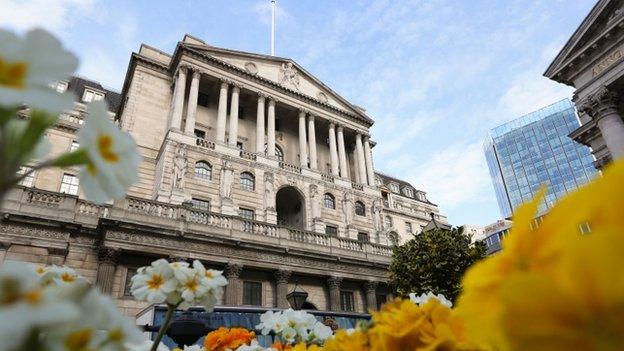Did Carney jump gun on interest rate rise?
- Published
- comments

With inflation falling, wage increases still nugatory, and demand worse than expected in the UK's two biggest export markets - the eurozone and US - why oh why did the governor of the Bank of England signal last week that interest rates could start to rise this year?
Today's minutes of the Bank of England's Monetary Policy Committee meeting of 4 and 5 June shed a bit of light on this.
And the main argument appears to be this:
1) that the economy is gradually returning to normal;
2) so we should all prepare ourselves for a world in which the Bank's "policy" interest rate is no longer almost zero;
3) that it is probably better for the interest rate rises to be tiny, certainly no more than 1/4% and perhaps as little as 1/8%;
4) and that if rate rises are going to be so small, it is better to get on with them sooner rather than later, to evaluate what kind of drag they might impose on growth (since the impact is difficult to judge in advance).
So although the data released since 5 June - in particular, a fall disclosed yesterday in CPI inflation to 1.5%, well below the Bank's 2% target - would perhaps suggest the Governor jumped the gun last week with his alert that an interest rate rise may be just over the hill, the minutes suggest there is still a better than evens chance of a rate rise in the autumn.
Their tone implies that more important than the backward-looking picture of inflation to the Bank's rate decision is a sense of whether the momentum of growth is being sustained - and therefore, that slack in the economy would be used up faster than the Bank anticipates.
Or to put it another way, unless there is a clear sign of the current rapid recovery slowing down, the Bank will probably impose a pre-emptive small interest rate rise - because of concern that otherwise wage increases could accelerate in a way that would fuel wider inflation (and yes I know most of you will mutter, through gritted teeth, that there's no bloomin' sign of wodges of cash being chucked at you right now).
Here is another perspective on this: the Bank seems to have a marginally greater institutional fear of allowing inflation to take hold, rather than choking off recovery.
Which should not be a shock: it is, after all, a central bank.
Perhaps more surprising is the way that the members of the MPC seem to have sprinkled a bit of cold water on the governor's concerns that the greatest threat to sustainable growth in the UK is the incipient bubble in the housing market.
They flag up three successive months of falls in mortgage approvals, and note that mortgage applications and new buyer inquiries also appear to be weakening.
What they can't judge is whether this is a significant and lasting consequence of the new requirement on banks to be more prudent in their mortgage lending, imposed by the Mortgage Market Review, or a temporary hiatus caused by the introduction of that requirement.
They also posit that potential buyers are being sensible and are being put off by high house prices. Hmmm.
In other words, it is very uncertain whether the current excessive exuberance in house prices - and the danger that some banks are still lending too recklessly - will more or less naturally be replaced by calmer conditions, without evasive action by the Bank.
Which shows that next week's decision by the MPC's Bank of England sister - the Financial Policy Committee - on whether and how to take the heat of fast-rising house prices will not be an easy one.